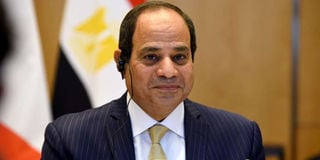Egypt's Abdel Fattah al-Sisi rules out extending presidential term

Egypt's President Abdel Fattah al-Sisi during a press conference with his French counterpart at the Elysee Palace in Paris on October 24, 2017. He has ruled out a constitutional amendment to extend his term in office. PHOTO | POOL | PHILIPPE WOJAZER | AFP
What you need to know:
- President Abdel Fattah al-Sisi was elected in 2014 after overthrowing his Islamist predecessor in 2013.
- He says an election would be held next year as planned and he will not run again in 2022.
- The Egyptian law indicates that a president will serve a maximum of two four-year terms.
- So far only one opponent, lawyer and dissident Khaled Ali, has announced his candidacy for the 2018 election.
CAIRO
Egypt's President Abdel Fattah al-Sisi ruled out a constitutional amendment to extend his term, saying an election would be held next year and he will not run again in 2022, in an interview with CNBC on Monday.
Sisi is a former army chief who overthrew his Islamist predecessor in 2013 and won an election a year later.
TERM LIMIT
Some of his supporters, including a member of parliament, want to allow Sisi to stay longer in office by extending the time between elections and removing the two four-year term limit.
But Sisi said elections will take place as scheduled in March or April 2018 and he would not ask for a constitutional amendment.
Sisi did not say he would run again but the former field marshal is expected to stand and win in another landslide in the absence of any serious opposition.
"I'm with preserving two four-year terms and not to change it," he told the American broadcaster.
"I'm not for any amendments to be made to the constitution in this period," he added.
97% VOTE
Sisi won the 2014 election with about 97 per cent of the vote. His only opponent, Hamdeen Sabahi, received less votes than spoiled ballots.
The president is popular among many Egyptians who say the country needs a firm hand following years of tumult that battered the economy.
But he has faced mounting criticism over a crackdown on Islamist and secular opponents and what rights groups say are increasingly repressive measures to stifle dissent.
ONE OPPONENT
So far only one opponent, lawyer and dissident Khaled Ali, has announced his candidacy for the 2018 election.
Ali, who challenged an unpopular government deal to hand over two Red Sea islands to Saudi Arabia, had run in the 2012 election that brought Islamist president Mohamed Morsi to power.
He received less than one per cent of the vote then.





